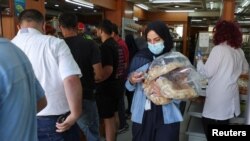The United Nations is warning that Lebanon is in a state of crisis, with millions of people out of work, and suffering from shortages of food, medicine, fuel and other essential needs.
The United Nations says soaring food prices are forcing 90% of Lebanese families to consume less expensive food, skimp on meals and reduce portion sizes. It warns spiking crude oil prices threaten to tip thousands of families over the edge, worsening food insecurity, malnutrition and hunger.
A recent survey finds almost a third of Lebanon’s labor force is unemployed, with youth unemployment at nearly 50%. U.N. resident coordinator for Lebanon Najat Rochdi said 2.2 million Lebanese, 86,000 migrants and 200,000 Palestine refugees need emergency aid, an increase of 46% over last year.
She said the outlook for the country’s financial stability is not good. She notes the World Bank projects Lebanon’s gross domestic product will contract by a further 6.5% this year, with inflation expected to reach devastating new heights.
“The socioeconomic meltdown in Lebanon has been further exacerbated by the impact of course of the Ukrainian crisis on the country, which is mainly reflected in the depletion of wheat reserves and the soaring prices of fuel items that are leading to drastic increases in bread prices and threatening food security in Lebanon," she said.
Rochdi said the health sector in Lebanon is on the verge of collapse at a time when needs are increasing significantly. She said hospitals are suffering from an acute shortage of medical supplies and power shortages, affecting patients’ care and lives.
She said nearly 4 million people are at immediate risk of being denied access to safe water because of severe electricity shortages in Lebanon. She said these crises are affecting everyone across the country, with women bearing the brunt of this multifaceted disaster.
“Alarmingly, gender-based violence and sexual exploitation and abuse are on the rise. We have received widespread reports of women and children feeling unsafe in public spaces such as streets, markets, or when using public transport … The crisis is also having a dramatic impact on children’s living conditions,” she said.
Rochdi said young people see no future for themselves and are leaving Lebanon in droves. She warns this brain drain is depriving the country of the brightest, skilled people needed to boost its economy and development.




